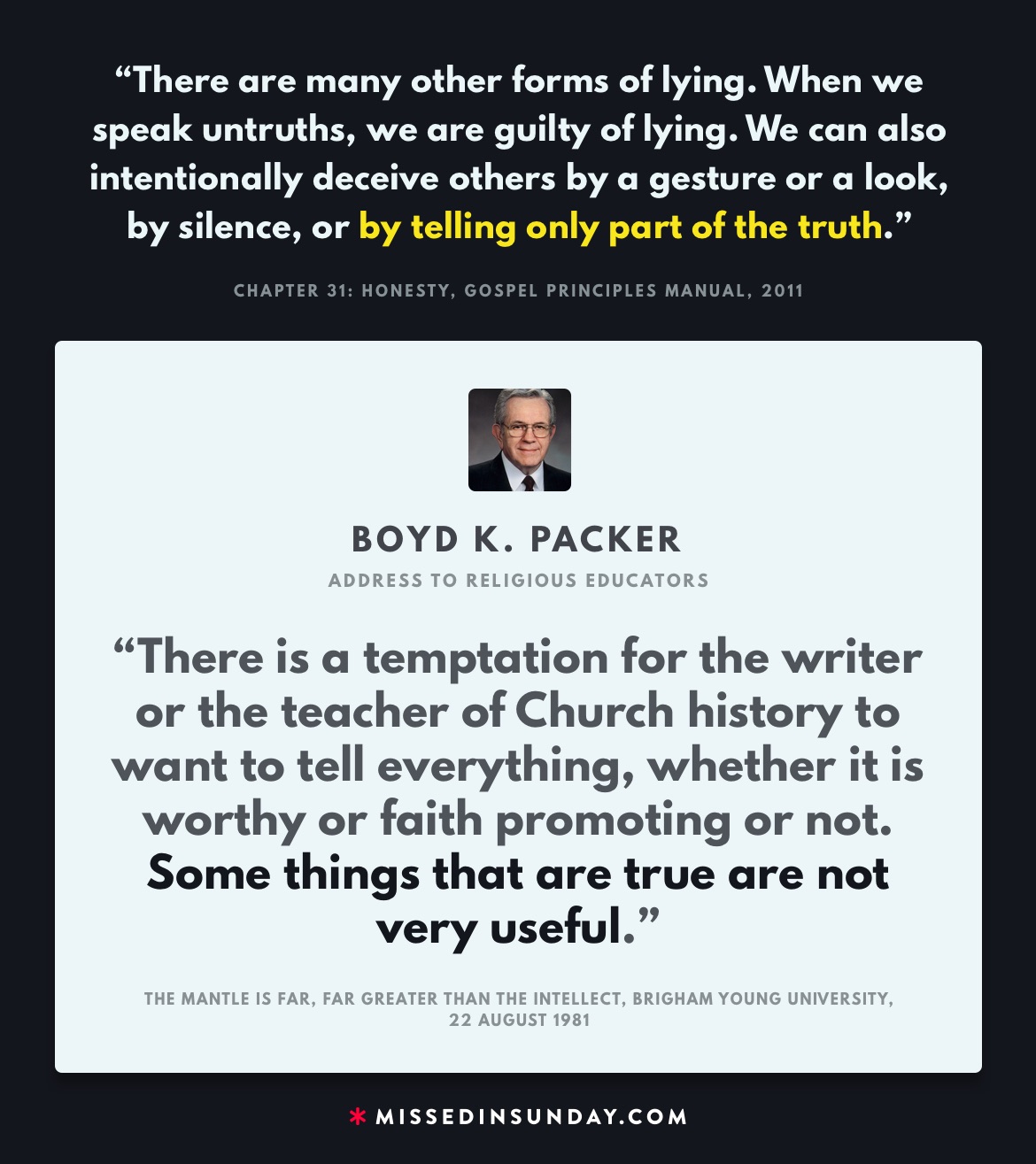For years we had hoped to purchase the internet domain sites ChurchofJesusChrist.org and ChurchofJesusChrist.com. Neither was for sale. About the time of President Nelson’s announcement, both were suddenly available. It was a miracle.
Neil L. Andersen
October 2021 General Conference
https://www.churchofjesuschrist.org/study/general-conference/2021/10/58andersen?lang=eng
Tag: Miracle
-
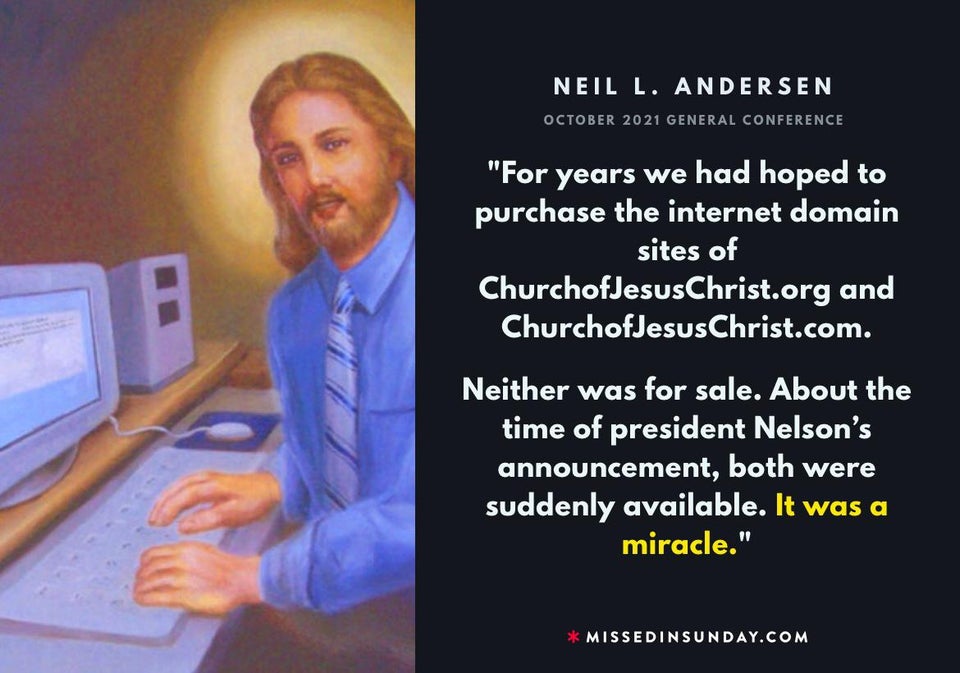
Internet Domain Miracle
-

Excommunication
Excerpt from Spencer W. Kimball’s ‘Miracle of Forgiveness’, Pg. 328-330: 1
Excommunication
The scriptures speak of Church members being “cast out” or “cut off,” or having their names “blotted out.” This means excommunication. This dread action means the total severance of the individual from the Church. The person who is excommunicated loses his membership in the Church and all attendant blessings. As an excommunicant, he is in a worse situation than he was before he joined the Church. He has lost the Holy Ghost, his priesthood, his endowments, his sealings, his privileges and his claim upon eternal life. This is about the saddest thing which could happen to an individual. Better that he suffer poverty, persecution, sickness, and even death. A true Latter-day Saint would far prefer to see a loved one in his bier than excommunicated from the Church. If the one cut off did not have this feeling of desolateness and barrenness and extreme loss, it would be evidence that he did not understand the meaning of excommunication.
An excommunicant has no Church privileges. He may not attend priesthood meetings (since he has no priesthood); he may not partake of the sacrament, serve in Church positions, offer public prayers, or speaks in meetings; he may not pay tithing except under certain conditions as determined by the bishop. He is “cut off,” “cast out,” and turned over to his Lord for the final judgment. “It is a fearful thing to fall into the hands of the living God” ( Heb. 10:31 ), and especially already branded as an apostate or transgressor.
Inasmuch as ye are cut off for transgression, ye cannot escape the buffetings of Satan until the day of redemption.
And I now give unto you power from this very hour, that if any man among you, of the order, is found a transgressor and repenteth not of the evil, that ye shall deliver him over unto the buffetings of Satan; and he shall not have power to bring evil upon you. ( D&C 104:9-10 .)
There is a possibility of an excommunicant returning to the blessings of the Church with full membership, and this can be done only through baptism following satisfactory repentance. The way is hard and rough and, without the help of the Holy Ghost to whisper and plead and warn and encourage, one’s climb is infinitely harder than if he were to repent before he lost the Holy Ghost, his membership, and the fellowship of the saints. The time is usually long, very long, as those who have fought their way back will attest. Any who have been finally restored would give the same advice: Repent first-do not permit yourself to be excommunicated if there is a possible way to save yourself from that dire calamity.
Ample scriptures indicate the power of proper Church authorities to judge its members in sin. The prophet Alma judged those who had been in iniquity and who confessed and repented, and waived the usual penalties.
And whosoever repented of their sins and did confess them, them he did number among the people of the church; And those that would not confess their sins and repent of their iniquity, the same were not numbered among the people of the church, and their names were blotted out.
And it came to pass that Alma did regulate all the affairs of the church. ( Mos. 26:35-37 .)
The Lord had previously said to Alma:
Therefore I say unto you, Go; and whosoever transgresseth against me, him shall ye judge according to the sins which he has committed; and if he confess his sins before thee and me, and repenteth in the sincerity of his heart, him shall ye forgive, and I will forgive him also. ( Mos. 26:29 .)
When the Lord told the Palestinians, “Judge not that ye be not judged,” he evidently was giving general instructions to the mass of humanity through the assembly gathered. In the scripture above quoted, he is talking to ecclesiastical leaders whose responsibility it is to judge the people and regulate the affairs of the Church. As an individual, the bishop or other Church leader will not judge his fellowman, but in his official position as bishop and judge he must be the judge of their actions.
The Lord’s promise to Alma is reassuring: “Yea, and as often as my people repent will I forgive them their trespasses against me.” ( Mos. 26:30 .)
References
References 1 Spencer W. Kimball, ‘Miracle of Forgiveness’, Pg. 329-330 – https://archive.org/details/MiracleOfForgiveness -
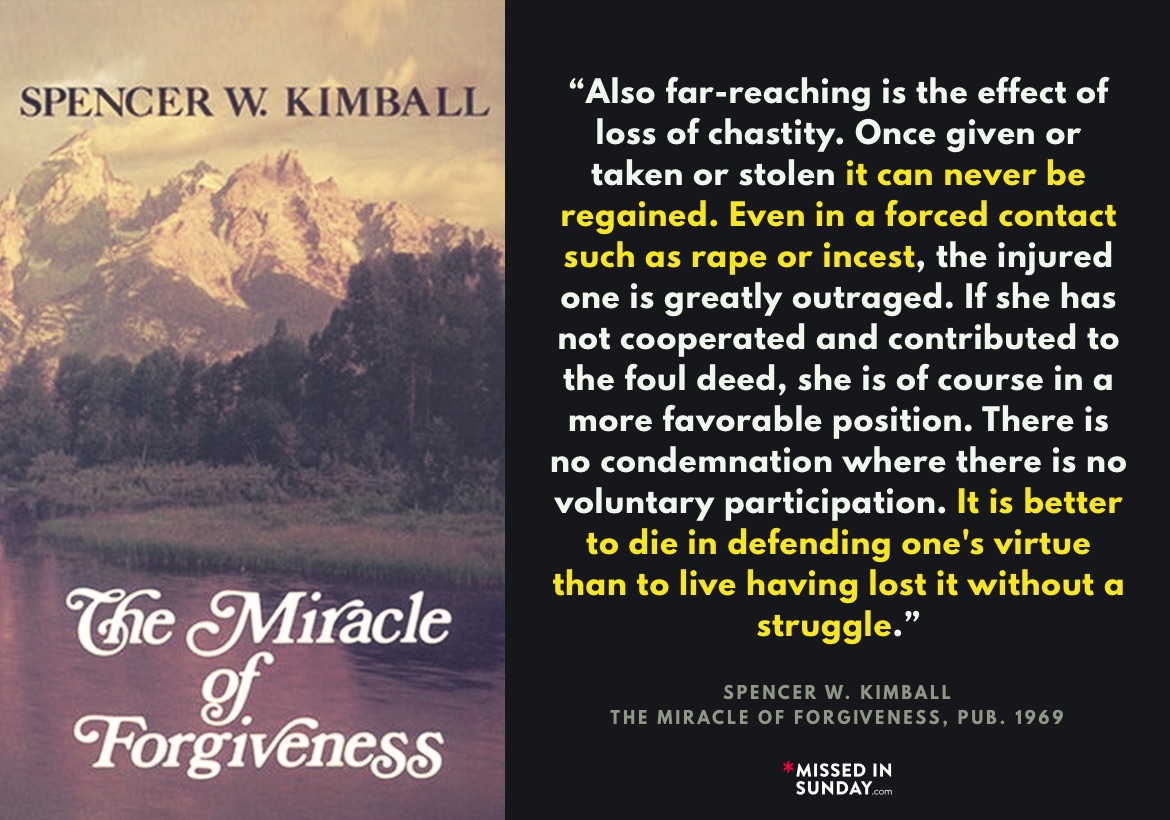
The Miracle
Excerpt from the Miracle of Forgiveness, by Spencer W. Kimball, Pg. 196: 1
Restitution for Loss of Chastity
Also far-reaching is the effect of loss of chastity. Once given or taken or stolen it can never be regained.
Even in a forced contact such as rape or incest, the injured one is greatly outraged. If she has not
cooperated and contributed to the foul deed, she is of course in a more favorable position. There is no
condemnation where there is no voluntary participation. It is better to die in defending one’s virtue than
to live having lost it without a struggle.As stated throughout this book, while one may recover in large measure from sexual sins they are
nevertheless heinous, and because of their gravity the Lord has placed them very close to the
unpardonable ones in order of seriousness.References
References 1 The Miracle of Forgiveness – https://archive.org/details/MiracleOfForgiveness -

As Anticipated
Excerpt from a February 27, 2015 interview with Apostle Jeffrey R. Holland and Hugh Hewitt: 1
HH: The first was a man, the second was a woman. I would wonder what the burden of having all these young people on the road in an era of religious intolerance is like.
JH: It is a burden. It is a worry. We proceed with great faith. We say a lot of prayers on behalf of those young people, because they’re your sons and daughters and my sons and daughters, collectively speaking, and they’re someone’s child. And we worry about them a lot. But the miracle is that every indication we have, and we try to be very careful, we try to be very sensitive about where they work and to what locations they’re assigned and so on and so forth, but having said that, the statistics are that they’re safer in the mission field than they were at home. The chances for an accident, the chances for a serious difficulty or a death, are really minimal. We have been very, very blessed. We knock on wood and say our prayer, and don’t want to be arrogant about that, because there is a very high risk. But we’re greatly blessed, and they continue to come They continue to serve. And those numbers will increase. We’re projecting out probably within four years, the baseline number for the missionary force will be something around 100,000.
Excerpt from the February 1, 2018 LDS News Release ‘Church Announces Mission Adjustments’: 2
“Changes to mission boundaries are common. Since President Thomas S. Monson announced in 2012 the change in the ages for missionary service, the Church has created 76 new missions to accommodate a surge of growth in only a few years, from 58,000 to 88,000 missionaries. The initial wave of missionaries has since receded to about 68,000 missionaries, as anticipated.”
References
References 1 A Conversation with LDS Elder Jeffrey Holland, Hugh Hewitt – http://www.hughhewitt.com/a-conversation-with-lds-elder-jeffrey-holland/ 2 Church Announces Mission Adjustments, Mormon Newsroom – https://www.mormonnewsroom.org/article/mission-adjustments-2018 -
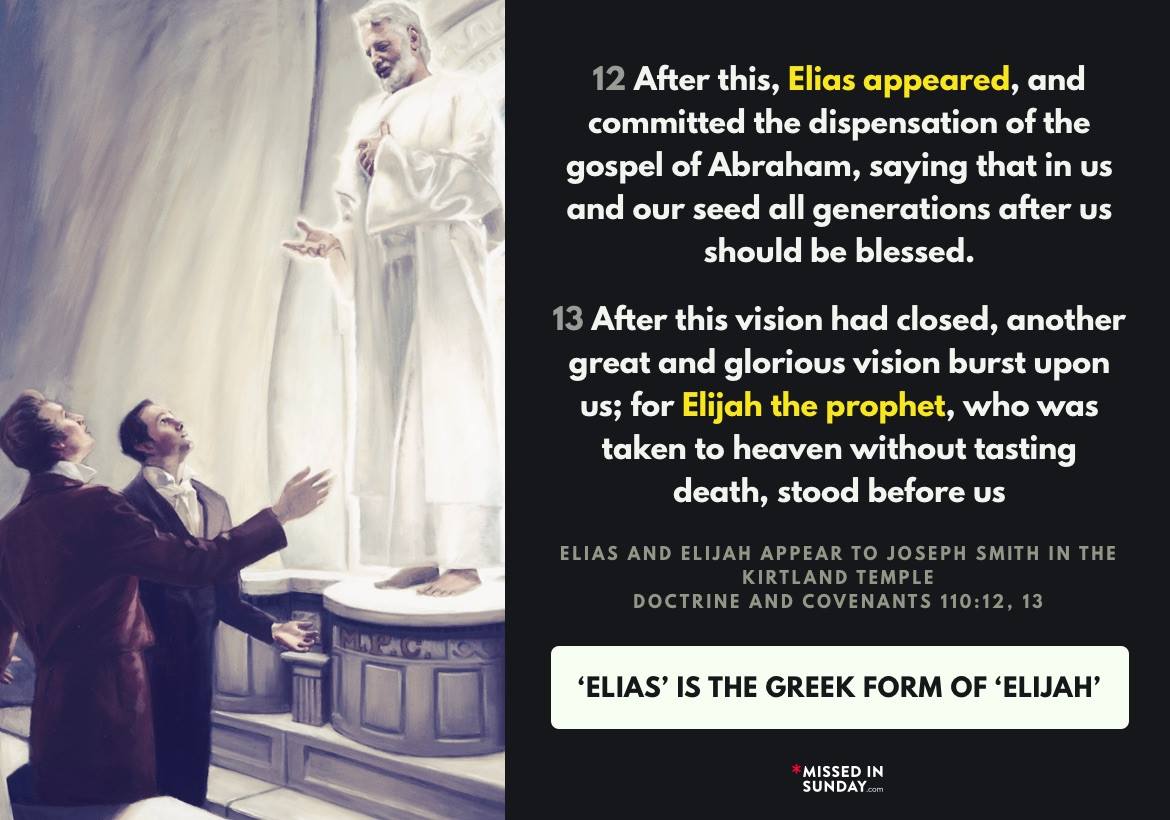
Elias and Elijah
Doctrine and Covenants 110:12, 13: 1
12 After this, Elias appeared, and committed the dispensation of the gospel of Abraham, saying that in us and our seed all generations after us should be blessed.
13 After this vision had closed, another great and glorious vision burst upon us; for Elijah the prophet, who was taken to heaven without tasting death, stood before us, and said:
Entry on Elijah, Wikipedia: 2
Elijah (Hebrew: אֱלִיָּהוּ, Eliyahu, meaning “My God is Yahu/Jah”or Elias (/ɪˈlaɪ.əs/; Greek: Ηλίας Elías; Syriac: Elyāe; Arabic: إلياس or إليا, Ilyās or Ilyā) was a prophet and a miracle worker who lived in the northern kingdom of Israel during the reign of King Ahab (9th century BC), according to the Books of Kings in the Hebrew Bible.
References
References 1 D&C 110:12, 13 – https://www.lds.org/scriptures/dc-testament/dc/110?lang=eng 2 Elijah, Wikipedia – https://en.wikipedia.org/wiki/Elijah -
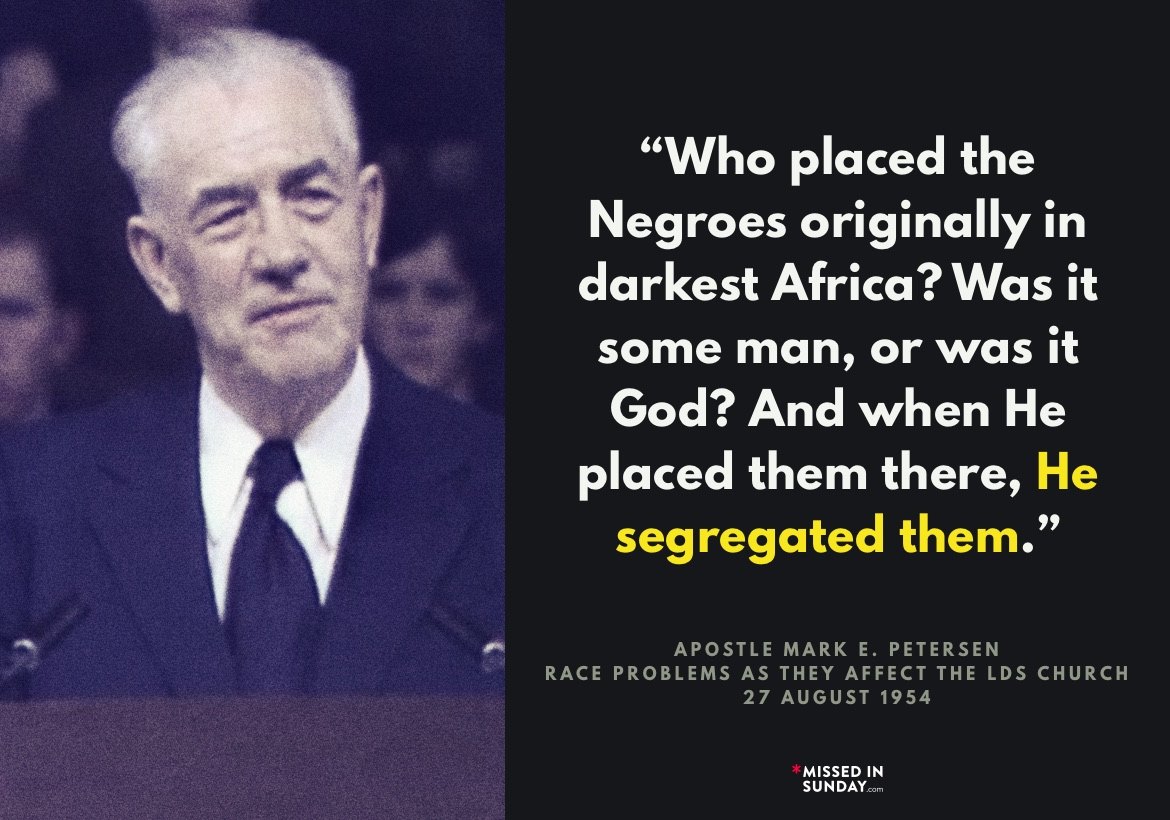
Segregation
Excerpts from a 1954 Address by Apostle Mark E. Petersen, ‘Race Problems As They Affect The Church’: 1
“It is a good thing to understand exactly what the Negro has in mind on this subject, I’ll be talking about other races besides Negroes, of course, but it is the Negro question which pinpoints it, so I would like to talk first of all about the Negro and his civil rights. We who teach in the Church certainly must have our feet on the ground and not be led astray by the philosophies of men on this subject any more than any other subject.”
“I think I have read enough to give you an idea of what the Negro is after. He is not just seeking the opportunity of sitting down in a café where white people sit. He isn’t just trying to ride on the same streetcar or the same Pullman car with white people. From this and other interviews I have read, it appears that the Negro seeks absorption with the white race. He will not. be satisfied until he achieves it by intermarriage. That is his objective and we must face it. We must not allow our feelings to carry us away, nor must we feel so sorry for Negroes that, we will open our arms and embrace them with everything we have. Remember the little statement that they used to say about sin, “First we pity, then endure, then embrace.””
“Is there any reason to think that the same principle of rewards and punishments did not apply to us and our deeds in the pre-existent world as will apply hereafter? Is there reason then why the type of birth we receive in this life is not a reflection of our worthiness or lack of it in the pre-existent life? We must accept the justice of God. He is fair to all. He is not a respector of persons. He will meet to us according to what we deserve. With that in mind, we can account in no other way for the birth of some of the children of God in darkest Africa, or in flood-ridden China, or among the starving hordes of India, while some of the rest of us are born in the United States? We cannot escape the conclusion that because of performance in our pre-existence some of us are born as Chinese, some as Japanese, some as Indians, some as Negroes, some as Americans, some as Latter-day Saints. There are rewards and punishments, fully in harmony with His established policy in dealing with sinners and saints, regarding all according to their deeds.”
“Was segregation a wrong principle? When the Lord chose the nations to which the spirits were to come, determining that some would be Japanese and some would be Chinese and some Negroes and some Americans, He engaged in an act of segregation. When He permitted the banishment of Hagar and Ishmael again He indulged in segregation. In the case of Jacob and Esau, He engaged in segregation. When He preserved His people Israel in Egypt for 400 years, He engaged in an act of segregation, and when He brought them up out of Egypt and gave them their own land, He engaged in an act of segregation. We speak of the miracle of the preservation of the Jews as a separate people over all these years. It was nothing more or less than an act in segregation. I’m sure the Lord had His hand in it because the Jews still have a great mission to perform. In placing a curse on Laman and Lemuel, He engaged in segregation. When He placed the mark upon Cain, He engaged in segregation. When he told Enoch not to preach the gospel to the descendants of Cain who were black, the Lord engaged in segregation. When He cursed the descendants of Cain as to the Priesthood, He engaged in segregation. When He forbade intermarriages as He does in Deuteronomy, Chapter 7, He established segregation.”
“Who placed the Negroes originally in darkest Africa? Was it some man, or was it God? And when He placed them there, He segregated them.”
“The Lord segregated the people both as to blood and place of residence, at least in the bases of the Lamanites and the Negroes we have the definite word of the Lord himself that He placed a dark skin upon then: as a curse — as a sign to all others. He forbade inter-marriage with them under threat of extension of the curse (2 Nephi 5:21) And He certainly segregated the descendants of Cain when He cursed the Negro as to the Priesthood, and drew an absolute line. You may even say He dropped an iron curtain there. The Negro was cursed as to the Priesthood, and therefore, was cursed as to the blessings of the Priesthood. Certainly God made a segregation there.”
“Think of the Negro, cursed as to the Priesthood. Are we prejudiced, against him? Unjustly, sometimes we’re accused of having such a prejudice. But what does the mercy of God have for him? This Negro, who in the pre-existence life lived the type of life which justified the Lord in sending him to the earth in the lineage of Cain with a black skin, and possibly being born in darkest Africa – if that Negro is willing when he hears the gospel to accept it, he may have many of the blessings of the gospel. In spite of all he did in the pre-existent life, the Lord is willing, if the Negro accepts the gospel with real, sincere faith, and is really converted, to give him the blessings of baptism and the gift of the Holy Ghost. If that Negro is faithful all his days, he can and will enter the Celestial Kingdom. He will go there as a servant, but he will get a Celestial resurrection. He will get a place in the celestial glory. He will not go then even with the honorable men of the earth to the Terrestrial glory, nor with the ones spoken of as being without law.”
“Well, what about the removal of the curse? We know what the Lord has said in the Book of Mormon in regard to the Lamanites – they shall become a white and delightsome people. I know of no scripture having to do with the removal of the curse from the Negro.”
“Now what is our policy in regard to intermarriage? As to the Negro, of course, there is only one possible answer. We must not intermarry with the Negro.”
“If there is one drop of Negro blood in my children, as I have read to you, they receive the curse. There isn’t any argument, therefore, as to inter marriage with the Negro, is there? There are 50 million Negroes in the United States. If they were to achieve complete absorption with the white race, think what that would do. With 50 million Negroes inter-married with us, where would the priesthood be? who could hold it, in all America? Think what that would do to the work of the Church!”
“I would be willing that they have all the advantages they can get out of life in the world, but let them enjoy these things among themselves. I think the Lord segregated the Negro and who is man to change that segregation? It reminds me of the scripture on marriage, “what God hath joined together, let not man put asunder.” Only here we have the reverse of he thing–what God hath separated, let not man bring together again.”
References
References 1 Apostle Mark E. Petersen address given at The Convention of Teachers of Religion On The College Level, Provo, Utah August 27, 1954. Race Problems As They Affect The Church – https://archive.org/details/RaceProblemsAsTheyAffectTheChurchMarkEPetersen -
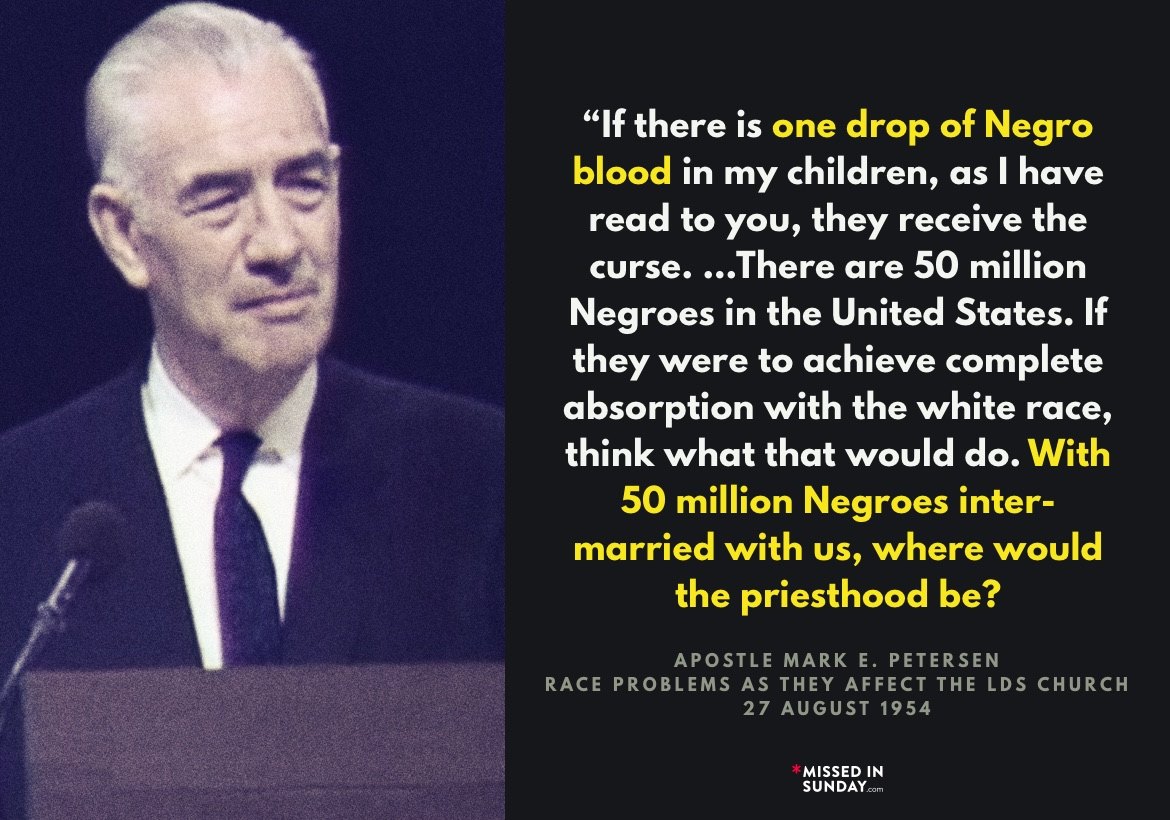
One Drop
Excerpts from a 1954 Address by Apostle Mark E. Petersen, ‘Race Problems As They Affect The Church’: 1
“It is a good thing to understand exactly what the Negro has in mind on this subject, I’ll be talking about other races besides Negroes, of course, but it is the Negro question which pinpoints it, so I would like to talk first of all about the Negro and his civil rights. We who teach in the Church certainly must have our feet on the ground and not be led astray by the philosophies of men on this subject any more than any other subject.”
“I think I have read enough to give you an idea of what the Negro is after. He is not just seeking the opportunity of sitting down in a café where white people sit. He isn’t just trying to ride on the same streetcar or the same Pullman car with white people. From this and other interviews I have read, it appears that the Negro seeks absorption with the white race. He will not. be satisfied until he achieves it by intermarriage. That is his objective and we must face it. We must not allow our feelings to carry us away, nor must we feel so sorry for Negroes that, we will open our arms and embrace them with everything we have. Remember the little statement that they used to say about sin, “First we pity, then endure, then embrace.””
“Is there any reason to think that the same principle of rewards and punishments did not apply to us and our deeds in the pre-existent world as will apply hereafter? Is there reason then why the type of birth we receive in this life is not a reflection of our worthiness or lack of it in the pre-existent life? We must accept the justice of God. He is fair to all. He is not a respector of persons. He will meet to us according to what we deserve. With that in mind, we can account in no other way for the birth of some of the children of God in darkest Africa, or in flood-ridden China, or among the starving hordes of India, while some of the rest of us are born in the United States? We cannot escape the conclusion that because of performance in our pre-existence some of us are born as Chinese, some as Japanese, some as Indians, some as Negroes, some as Americans, some as Latter-day Saints. There are rewards and punishments, fully in harmony with His established policy in dealing with sinners and saints, regarding all according to their deeds.”
“Was segregation a wrong principle? When the Lord chose the nations to which the spirits were to come, determining that some would be Japanese and some would be Chinese and some Negroes and some Americans, He engaged in an act of segregation. When He permitted the banishment of Hagar and Ishmael again He indulged in segregation. In the case of Jacob and Esau, He engaged in segregation. When He preserved His people Israel in Egypt for 400 years, He engaged in an act of segregation, and when He brought them up out of Egypt and gave them their own land, He engaged in an act of segregation. We speak of the miracle of the preservation of the Jews as a separate people over all these years. It was nothing more or less than an act in segregation. I’m sure the Lord had His hand in it because the Jews still have a great mission to perform. In placing a curse on Laman and Lemuel, He engaged in segregation. When He placed the mark upon Cain, He engaged in segregation. When he told Enoch not to preach the gospel to the descendants of Cain who were black, the Lord engaged in segregation. When He cursed the descendants of Cain as to the Priesthood, He engaged in segregation. When He forbade intermarriages as He does in Deuteronomy, Chapter 7, He established segregation.”
“Who placed the Negroes originally in darkest Africa? Was it some man, or was it God? And when He placed them there, He segregated them.”
“The Lord segregated the people both as to blood and place of residence, at least in the bases of the Lamanites and the Negroes we have the definite word of the Lord himself that He placed a dark skin upon then: as a curse — as a sign to all others. He forbade inter-marriage with them under threat of extension of the curse (2 Nephi 5:21) And He certainly segregated the descendants of Cain when He cursed the Negro as to the Priesthood, and drew an absolute line. You may even say He dropped an iron curtain there. The Negro was cursed as to the Priesthood, and therefore, was cursed as to the blessings of the Priesthood. Certainly God made a segregation there.”
“Think of the Negro, cursed as to the Priesthood. Are we prejudiced, against him? Unjustly, sometimes we’re accused of having such a prejudice. But what does the mercy of God have for him? This Negro, who in the pre-existence life lived the type of life which justified the Lord in sending him to the earth in the lineage of Cain with a black skin, and possibly being born in darkest Africa – if that Negro is willing when he hears the gospel to accept it, he may have many of the blessings of the gospel. In spite of all he did in the pre-existent life, the Lord is willing, if the Negro accepts the gospel with real, sincere faith, and is really converted, to give him the blessings of baptism and the gift of the Holy Ghost. If that Negro is faithful all his days, he can and will enter the Celestial Kingdom. He will go there as a servant, but he will get a Celestial resurrection. He will get a place in the celestial glory. He will not go then even with the honorable men of the earth to the Terrestrial glory, nor with the ones spoken of as being without law.”
“Well, what about the removal of the curse? We know what the Lord has said in the Book of Mormon in regard to the Lamanites – they shall become a white and delightsome people. I know of no scripture having to do with the removal of the curse from the Negro.”
“Now what is our policy in regard to intermarriage? As to the Negro, of course, there is only one possible answer. We must not intermarry with the Negro.”
“If there is one drop of Negro blood in my children, as I have read to you, they receive the curse. There isn’t any argument, therefore, as to inter marriage with the Negro, is there? There are 50 million Negroes in the United States. If they were to achieve complete absorption with the white race, think what that would do. With 50 million Negroes inter-married with us, where would the priesthood be? who could hold it, in all America? Think what that would do to the work of the Church!”
“I would be willing that they have all the advantages they can get out of life in the world, but let them enjoy these things among themselves. I think the Lord segregated the Negro and who is man to change that segregation? It reminds me of the scripture on marriage, “what God hath joined together, let not man put asunder.” Only here we have the reverse of he thing–what God hath separated, let not man bring together again.”
References
References 1 Apostle Mark E. Petersen address given at The Convention of Teachers of Religion On The College Level, Provo, Utah August 27, 1954. Race Problems As They Affect The Church – https://archive.org/details/RaceProblemsAsTheyAffectTheChurchMarkEPetersen -
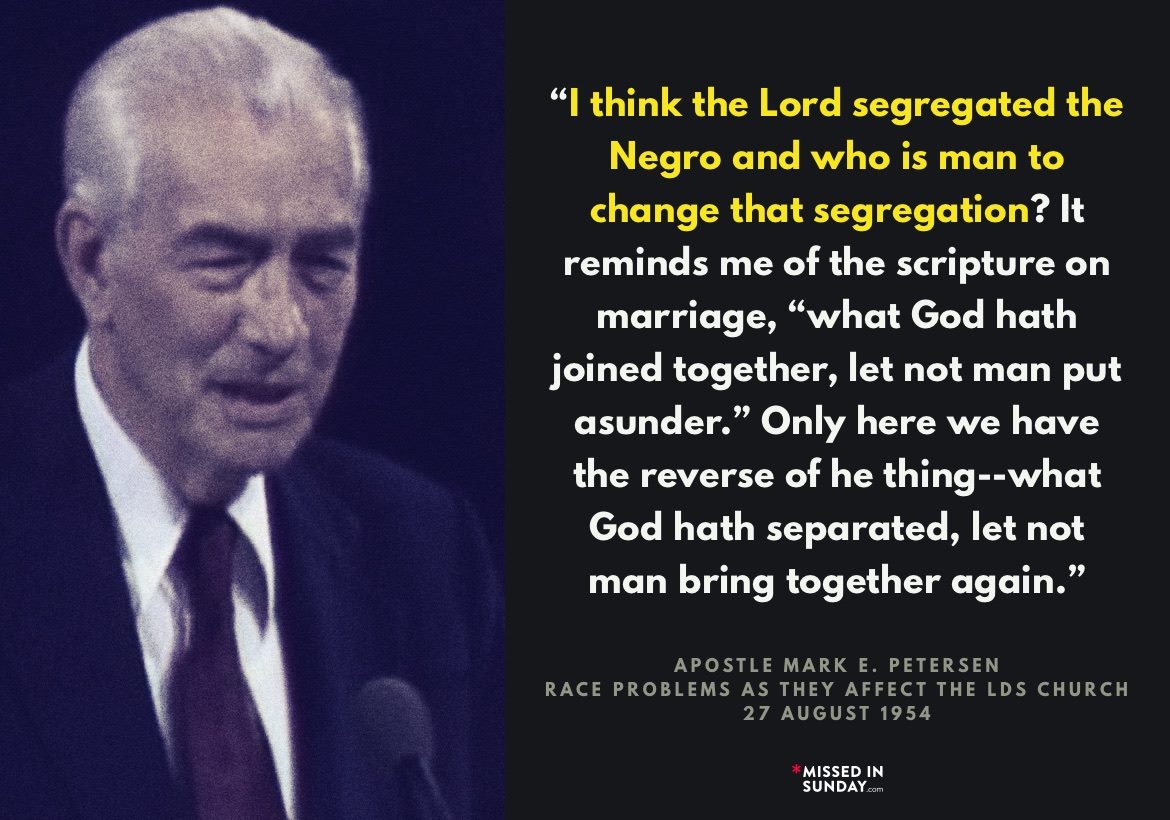
Lord’s Segregation
Excerpts from a 1954 Address by Apostle Mark E. Petersen, ‘Race Problems As They Affect The Church’: 1
“It is a good thing to understand exactly what the Negro has in mind on this subject, I’ll be talking about other races besides Negroes, of course, but it is the Negro question which pinpoints it, so I would like to talk first of all about the Negro and his civil rights. We who teach in the Church certainly must have our feet on the ground and not be led astray by the philosophies of men on this subject any more than any other subject.”
“I think I have read enough to give you an idea of what the Negro is after. He is not just seeking the opportunity of sitting down in a café where white people sit. He isn’t just trying to ride on the same streetcar or the same Pullman car with white people. From this and other interviews I have read, it appears that the Negro seeks absorption with the white race. He will not. be satisfied until he achieves it by intermarriage. That is his objective and we must face it. We must not allow our feelings to carry us away, nor must we feel so sorry for Negroes that, we will open our arms and embrace them with everything we have. Remember the little statement that they used to say about sin, “First we pity, then endure, then embrace.””
“Is there any reason to think that the same principle of rewards and punishments did not apply to us and our deeds in the pre-existent world as will apply hereafter? Is there reason then why the type of birth we receive in this life is not a reflection of our worthiness or lack of it in the pre-existent life? We must accept the justice of God. He is fair to all. He is not a respector of persons. He will meet to us according to what we deserve. With that in mind, we can account in no other way for the birth of some of the children of God in darkest Africa, or in flood-ridden China, or among the starving hordes of India, while some of the rest of us are born in the United States? We cannot escape the conclusion that because of performance in our pre-existence some of us are born as Chinese, some as Japanese, some as Indians, some as Negroes, some as Americans, some as Latter-day Saints. There are rewards and punishments, fully in harmony with His established policy in dealing with sinners and saints, regarding all according to their deeds.”
“Was segregation a wrong principle? When the Lord chose the nations to which the spirits were to come, determining that some would be Japanese and some would be Chinese and some Negroes and some Americans, He engaged in an act of segregation. When He permitted the banishment of Hagar and Ishmael again He indulged in segregation. In the case of Jacob and Esau, He engaged in segregation. When He preserved His people Israel in Egypt for 400 years, He engaged in an act of segregation, and when He brought them up out of Egypt and gave them their own land, He engaged in an act of segregation. We speak of the miracle of the preservation of the Jews as a separate people over all these years. It was nothing more or less than an act in segregation. I’m sure the Lord had His hand in it because the Jews still have a great mission to perform. In placing a curse on Laman and Lemuel, He engaged in segregation. When He placed the mark upon Cain, He engaged in segregation. When he told Enoch not to preach the gospel to the descendants of Cain who were black, the Lord engaged in segregation. When He cursed the descendants of Cain as to the Priesthood, He engaged in segregation. When He forbade intermarriages as He does in Deuteronomy, Chapter 7, He established segregation.”
“Who placed the Negroes originally in darkest Africa? Was it some man, or was it God? And when He placed them there, He segregated them.”
“The Lord segregated the people both as to blood and place of residence, at least in the bases of the Lamanites and the Negroes we have the definite word of the Lord himself that He placed a dark skin upon then: as a curse — as a sign to all others. He forbade inter-marriage with them under threat of extension of the curse (2 Nephi 5:21) And He certainly segregated the descendants of Cain when He cursed the Negro as to the Priesthood, and drew an absolute line. You may even say He dropped an iron curtain there. The Negro was cursed as to the Priesthood, and therefore, was cursed as to the blessings of the Priesthood. Certainly God made a segregation there.”
“Think of the Negro, cursed as to the Priesthood. Are we prejudiced, against him? Unjustly, sometimes we’re accused of having such a prejudice. But what does the mercy of God have for him? This Negro, who in the pre-existence life lived the type of life which justified the Lord in sending him to the earth in the lineage of Cain with a black skin, and possibly being born in darkest Africa – if that Negro is willing when he hears the gospel to accept it, he may have many of the blessings of the gospel. In spite of all he did in the pre-existent life, the Lord is willing, if the Negro accepts the gospel with real, sincere faith, and is really converted, to give him the blessings of baptism and the gift of the Holy Ghost. If that Negro is faithful all his days, he can and will enter the Celestial Kingdom. He will go there as a servant, but he will get a Celestial resurrection. He will get a place in the celestial glory. He will not go then even with the honorable men of the earth to the Terrestrial glory, nor with the ones spoken of as being without law.”
“Well, what about the removal of the curse? We know what the Lord has said in the Book of Mormon in regard to the Lamanites – they shall become a white and delightsome people. I know of no scripture having to do with the removal of the curse from the Negro.”
“Now what is our policy in regard to intermarriage? As to the Negro, of course, there is only one possible answer. We must not intermarry with the Negro.”
“If there is one drop of Negro blood in my children, as I have read to you, they receive the curse. There isn’t any argument, therefore, as to inter marriage with the Negro, is there? There are 50 million Negroes in the United States. If they were to achieve complete absorption with the white race, think what that would do. With 50 million Negroes inter-married with us, where would the priesthood be? who could hold it, in all America? Think what that would do to the work of the Church!”
“I would be willing that they have all the advantages they can get out of life in the world, but let them enjoy these things among themselves. I think the Lord segregated the Negro and who is man to change that segregation? It reminds me of the scripture on marriage, “what God hath joined together, let not man put asunder.” Only here we have the reverse of he thing–what God hath separated, let not man bring together again.”
References
References 1 Apostle Mark E. Petersen address given at The Convention of Teachers of Religion On The College Level, Provo, Utah August 27, 1954. Race Problems As They Affect The Church – https://archive.org/details/RaceProblemsAsTheyAffectTheChurchMarkEPetersen -
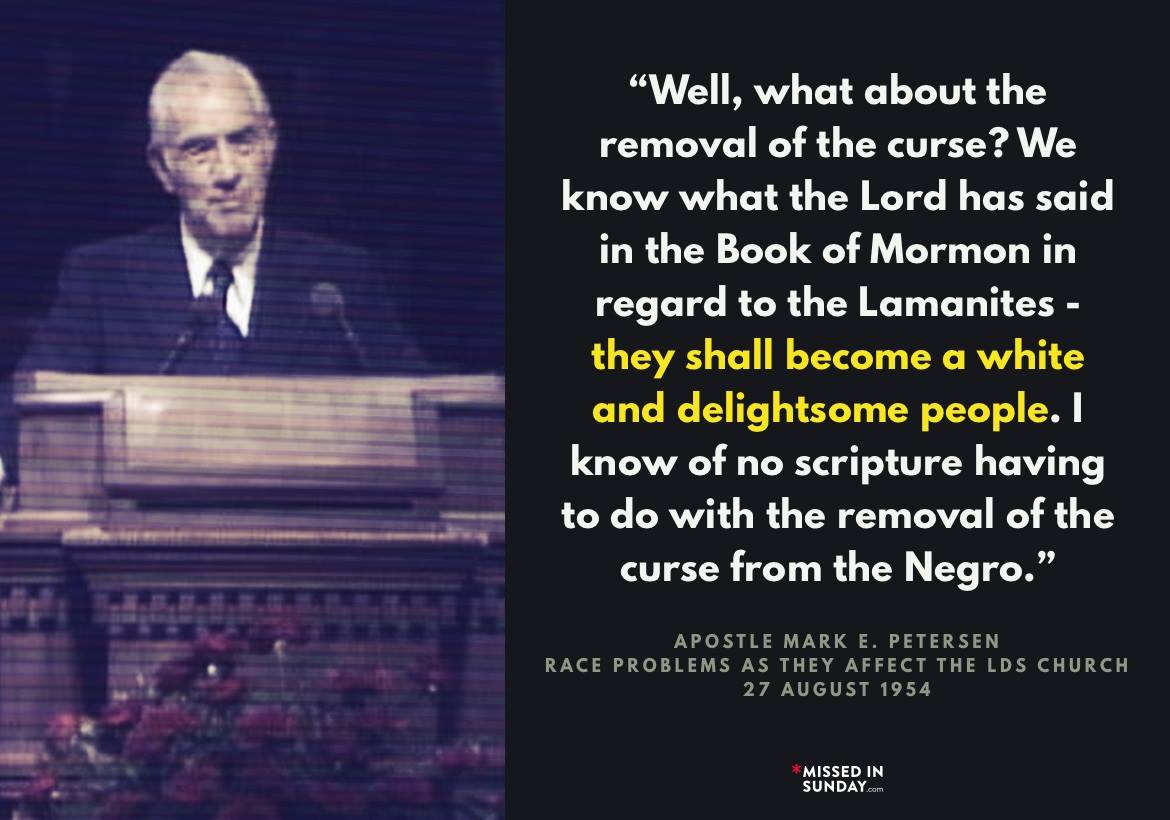
Become White
Excerpts from a 1954 Address by Apostle Mark E. Petersen, ‘Race Problems As They Affect The Church’: 1
“It is a good thing to understand exactly what the Negro has in mind on this subject, I’ll be talking about other races besides Negroes, of course, but it is the Negro question which pinpoints it, so I would like to talk first of all about the Negro and his civil rights. We who teach in the Church certainly must have our feet on the ground and not be led astray by the philosophies of men on this subject any more than any other subject.”
“I think I have read enough to give you an idea of what the Negro is after. He is not just seeking the opportunity of sitting down in a café where white people sit. He isn’t just trying to ride on the same streetcar or the same Pullman car with white people. From this and other interviews I have read, it appears that the Negro seeks absorption with the white race. He will not. be satisfied until he achieves it by intermarriage. That is his objective and we must face it. We must not allow our feelings to carry us away, nor must we feel so sorry for Negroes that, we will open our arms and embrace them with everything we have. Remember the little statement that they used to say about sin, “First we pity, then endure, then embrace.””
“Is there any reason to think that the same principle of rewards and punishments did not apply to us and our deeds in the pre-existent world as will apply hereafter? Is there reason then why the type of birth we receive in this life is not a reflection of our worthiness or lack of it in the pre-existent life? We must accept the justice of God. He is fair to all. He is not a respector of persons. He will meet to us according to what we deserve. With that in mind, we can account in no other way for the birth of some of the children of God in darkest Africa, or in flood-ridden China, or among the starving hordes of India, while some of the rest of us are born in the United States? We cannot escape the conclusion that because of performance in our pre-existence some of us are born as Chinese, some as Japanese, some as Indians, some as Negroes, some as Americans, some as Latter-day Saints. There are rewards and punishments, fully in harmony with His established policy in dealing with sinners and saints, regarding all according to their deeds.”
“Was segregation a wrong principle? When the Lord chose the nations to which the spirits were to come, determining that some would be Japanese and some would be Chinese and some Negroes and some Americans, He engaged in an act of segregation. When He permitted the banishment of Hagar and Ishmael again He indulged in segregation. In the case of Jacob and Esau, He engaged in segregation. When He preserved His people Israel in Egypt for 400 years, He engaged in an act of segregation, and when He brought them up out of Egypt and gave them their own land, He engaged in an act of segregation. We speak of the miracle of the preservation of the Jews as a separate people over all these years. It was nothing more or less than an act in segregation. I’m sure the Lord had His hand in it because the Jews still have a great mission to perform. In placing a curse on Laman and Lemuel, He engaged in segregation. When He placed the mark upon Cain, He engaged in segregation. When he told Enoch not to preach the gospel to the descendants of Cain who were black, the Lord engaged in segregation. When He cursed the descendants of Cain as to the Priesthood, He engaged in segregation. When He forbade intermarriages as He does in Deuteronomy, Chapter 7, He established segregation.”
“Who placed the Negroes originally in darkest Africa? Was it some man, or was it God? And when He placed them there, He segregated them.”
“The Lord segregated the people both as to blood and place of residence, at least in the bases of the Lamanites and the Negroes we have the definite word of the Lord himself that He placed a dark skin upon then: as a curse — as a sign to all others. He forbade inter-marriage with them under threat of extension of the curse (2 Nephi 5:21) And He certainly segregated the descendants of Cain when He cursed the Negro as to the Priesthood, and drew an absolute line. You may even say He dropped an iron curtain there. The Negro was cursed as to the Priesthood, and therefore, was cursed as to the blessings of the Priesthood. Certainly God made a segregation there.”
“Think of the Negro, cursed as to the Priesthood. Are we prejudiced, against him? Unjustly, sometimes we’re accused of having such a prejudice. But what does the mercy of God have for him? This Negro, who in the pre-existence life lived the type of life which justified the Lord in sending him to the earth in the lineage of Cain with a black skin, and possibly being born in darkest Africa – if that Negro is willing when he hears the gospel to accept it, he may have many of the blessings of the gospel. In spite of all he did in the pre-existent life, the Lord is willing, if the Negro accepts the gospel with real, sincere faith, and is really converted, to give him the blessings of baptism and the gift of the Holy Ghost. If that Negro is faithful all his days, he can and will enter the Celestial Kingdom. He will go there as a servant, but he will get a Celestial resurrection. He will get a place in the celestial glory. He will not go then even with the honorable men of the earth to the Terrestrial glory, nor with the ones spoken of as being without law.”
“Well, what about the removal of the curse? We know what the Lord has said in the Book of Mormon in regard to the Lamanites – they shall become a white and delightsome people. I know of no scripture having to do with the removal of the curse from the Negro.”
“Now what is our policy in regard to intermarriage? As to the Negro, of course, there is only one possible answer. We must not intermarry with the Negro.”
“If there is one drop of Negro blood in my children, as I have read to you, they receive the curse. There isn’t any argument, therefore, as to inter marriage with the Negro, is there? There are 50 million Negroes in the United States. If they were to achieve complete absorption with the white race, think what that would do. With 50 million Negroes inter-married with us, where would the priesthood be? who could hold it, in all America? Think what that would do to the work of the Church!”
“I would be willing that they have all the advantages they can get out of life in the world, but let them enjoy these things among themselves. I think the Lord segregated the Negro and who is man to change that segregation? It reminds me of the scripture on marriage, “what God hath joined together, let not man put asunder.” Only here we have the reverse of he thing–what God hath separated, let not man bring together again.”
References
References 1 Apostle Mark E. Petersen address given at The Convention of Teachers of Religion On The College Level, Provo, Utah August 27, 1954. Race Problems As They Affect The Church – https://archive.org/details/RaceProblemsAsTheyAffectTheChurchMarkEPetersen -
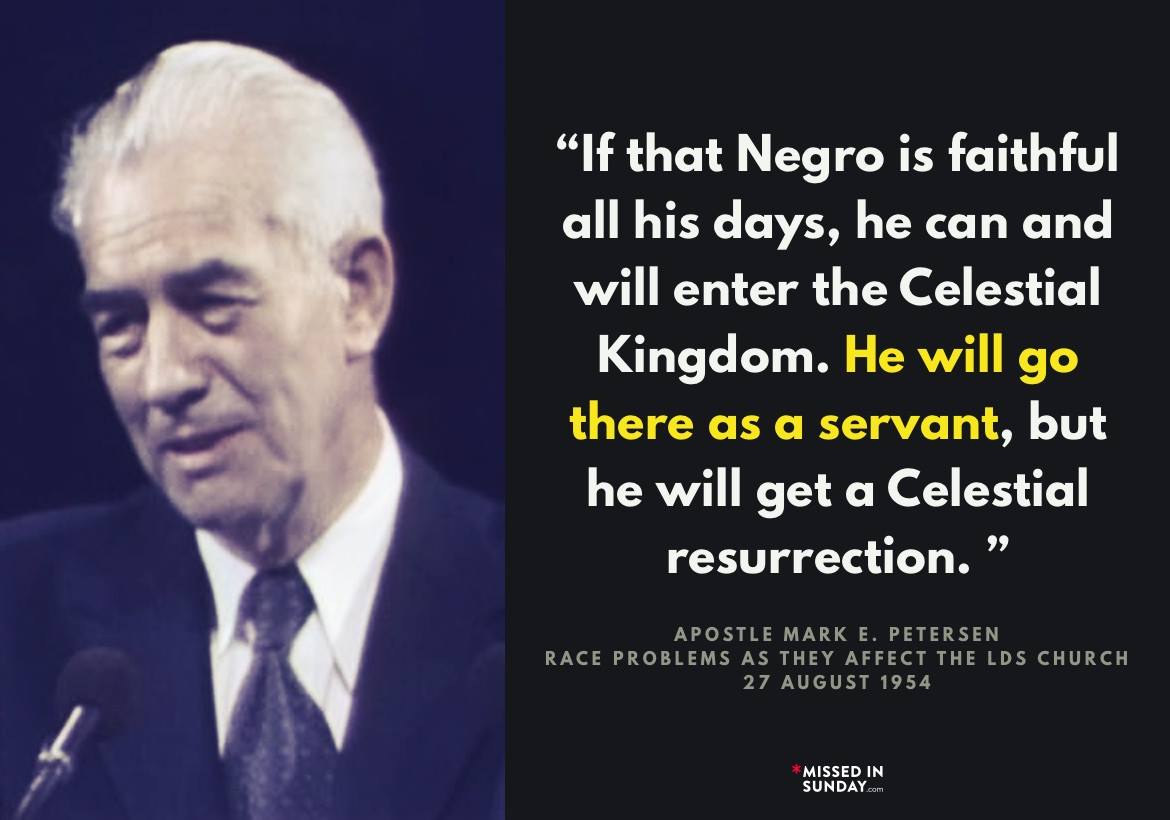
Go as a Servant
Excerpts from a 1954 Address by Apostle Mark E. Petersen, ‘Race Problems As They Affect The Church’: 1
“It is a good thing to understand exactly what the Negro has in mind on this subject, I’ll be talking about other races besides Negroes, of course, but it is the Negro question which pinpoints it, so I would like to talk first of all about the Negro and his civil rights. We who teach in the Church certainly must have our feet on the ground and not be led astray by the philosophies of men on this subject any more than any other subject.”
“I think I have read enough to give you an idea of what the Negro is after. He is not just seeking the opportunity of sitting down in a café where white people sit. He isn’t just trying to ride on the same streetcar or the same Pullman car with white people. From this and other interviews I have read, it appears that the Negro seeks absorption with the white race. He will not. be satisfied until he achieves it by intermarriage. That is his objective and we must face it. We must not allow our feelings to carry us away, nor must we feel so sorry for Negroes that, we will open our arms and embrace them with everything we have. Remember the little statement that they used to say about sin, “First we pity, then endure, then embrace.””
“Is there any reason to think that the same principle of rewards and punishments did not apply to us and our deeds in the pre-existent world as will apply hereafter? Is there reason then why the type of birth we receive in this life is not a reflection of our worthiness or lack of it in the pre-existent life? We must accept the justice of God. He is fair to all. He is not a respector of persons. He will meet to us according to what we deserve. With that in mind, we can account in no other way for the birth of some of the children of God in darkest Africa, or in flood-ridden China, or among the starving hordes of India, while some of the rest of us are born in the United States? We cannot escape the conclusion that because of performance in our pre-existence some of us are born as Chinese, some as Japanese, some as Indians, some as Negroes, some as Americans, some as Latter-day Saints. There are rewards and punishments, fully in harmony with His established policy in dealing with sinners and saints, regarding all according to their deeds.”
“Was segregation a wrong principle? When the Lord chose the nations to which the spirits were to come, determining that some would be Japanese and some would be Chinese and some Negroes and some Americans, He engaged in an act of segregation. When He permitted the banishment of Hagar and Ishmael again He indulged in segregation. In the case of Jacob and Esau, He engaged in segregation. When He preserved His people Israel in Egypt for 400 years, He engaged in an act of segregation, and when He brought them up out of Egypt and gave them their own land, He engaged in an act of segregation. We speak of the miracle of the preservation of the Jews as a separate people over all these years. It was nothing more or less than an act in segregation. I’m sure the Lord had His hand in it because the Jews still have a great mission to perform. In placing a curse on Laman and Lemuel, He engaged in segregation. When He placed the mark upon Cain, He engaged in segregation. When he told Enoch not to preach the gospel to the descendants of Cain who were black, the Lord engaged in segregation. When He cursed the descendants of Cain as to the Priesthood, He engaged in segregation. When He forbade intermarriages as He does in Deuteronomy, Chapter 7, He established segregation.”
“Who placed the Negroes originally in darkest Africa? Was it some man, or was it God? And when He placed them there, He segregated them.”
“The Lord segregated the people both as to blood and place of residence, at least in the bases of the Lamanites and the Negroes we have the definite word of the Lord himself that He placed a dark skin upon then: as a curse — as a sign to all others. He forbade inter-marriage with them under threat of extension of the curse (2 Nephi 5:21) And He certainly segregated the descendants of Cain when He cursed the Negro as to the Priesthood, and drew an absolute line. You may even say He dropped an iron curtain there. The Negro was cursed as to the Priesthood, and therefore, was cursed as to the blessings of the Priesthood. Certainly God made a segregation there.”
“Think of the Negro, cursed as to the Priesthood. Are we prejudiced, against him? Unjustly, sometimes we’re accused of having such a prejudice. But what does the mercy of God have for him? This Negro, who in the pre-existence life lived the type of life which justified the Lord in sending him to the earth in the lineage of Cain with a black skin, and possibly being born in darkest Africa – if that Negro is willing when he hears the gospel to accept it, he may have many of the blessings of the gospel. In spite of all he did in the pre-existent life, the Lord is willing, if the Negro accepts the gospel with real, sincere faith, and is really converted, to give him the blessings of baptism and the gift of the Holy Ghost. If that Negro is faithful all his days, he can and will enter the Celestial Kingdom. He will go there as a servant, but he will get a Celestial resurrection. He will get a place in the celestial glory. He will not go then even with the honorable men of the earth to the Terrestrial glory, nor with the ones spoken of as being without law.”
“Well, what about the removal of the curse? We know what the Lord has said in the Book of Mormon in regard to the Lamanites – they shall become a white and delightsome people. I know of no scripture having to do with the removal of the curse from the Negro.”
“Now what is our policy in regard to intermarriage? As to the Negro, of course, there is only one possible answer. We must not intermarry with the Negro.”
“If there is one drop of Negro blood in my children, as I have read to you, they receive the curse. There isn’t any argument, therefore, as to inter marriage with the Negro, is there? There are 50 million Negroes in the United States. If they were to achieve complete absorption with the white race, think what that would do. With 50 million Negroes inter-married with us, where would the priesthood be? who could hold it, in all America? Think what that would do to the work of the Church!”
“I would be willing that they have all the advantages they can get out of life in the world, but let them enjoy these things among themselves. I think the Lord segregated the Negro and who is man to change that segregation? It reminds me of the scripture on marriage, “what God hath joined together, let not man put asunder.” Only here we have the reverse of he thing–what God hath separated, let not man bring together again.”
References
References 1 Apostle Mark E. Petersen address given at The Convention of Teachers of Religion On The College Level, Provo, Utah August 27, 1954. Race Problems As They Affect The Church – https://archive.org/details/RaceProblemsAsTheyAffectTheChurchMarkEPetersen -
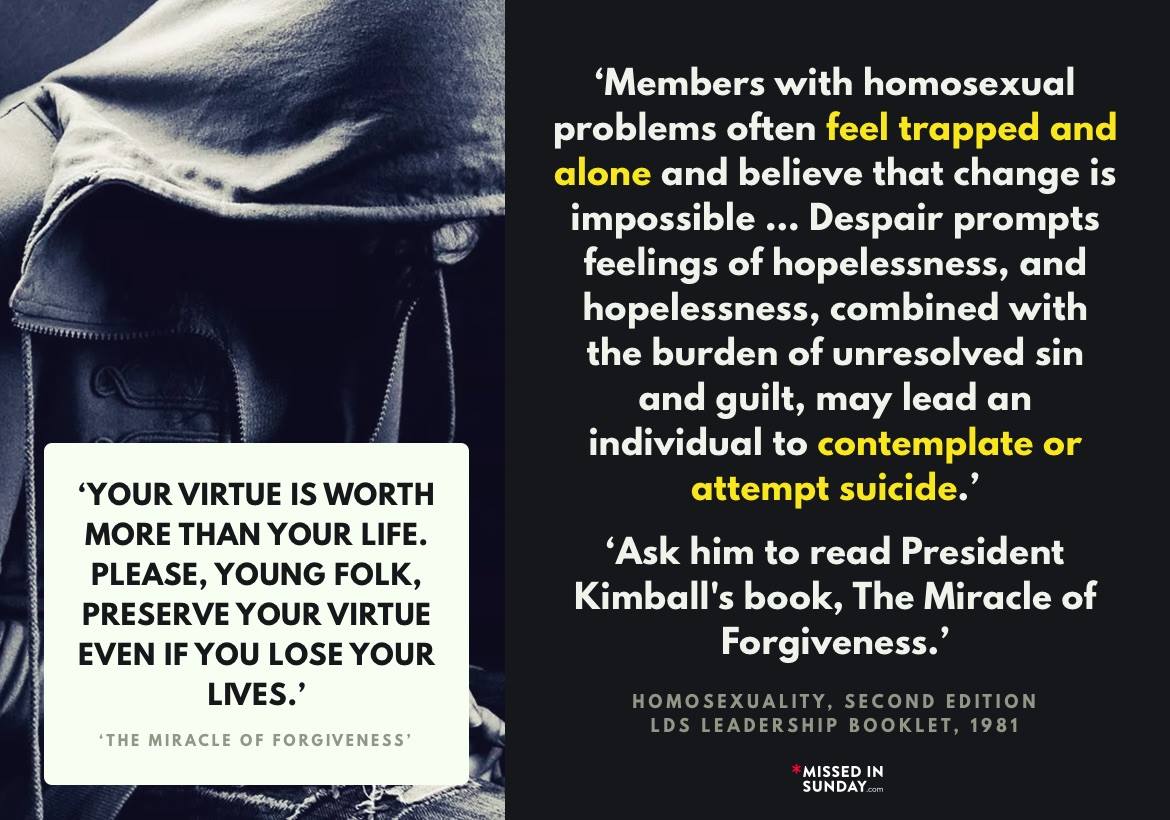
Alone
Excerpt from a 1981 booklet addressing ‘Homosexuality’, published as a guide to be used for local leaders when working with homosexual members: 1
Pg. 4
“Members with homosexual problems often feel trapped and alone and believe that change is impossible … Despair prompts feelings of hopelessness, and hopelessness, combined with the burden of unresolved sin and guilt, may lead an individual to contemplate or attempt suicide. Repentance and the Lord’s spirit can lift him from the thoughts of suicide to peace of mind.”
Pg. 5
“Ask him to read President Kimball’s book, The Miracle of Forgiveness. (Chapter 6 deals specifically with homosexuality, but the entire book should be read.)”
Excerpt from the Miracle of Forgiveness by Spencer W. Kimball: 2
David O. McKay has pleaded:
… Your virtue is worth more than your life. Please, young folk, preserve your virtue even if you lose
your lives. Do not tamper with sin … do not permit yourselves to be led into temptation. Conduct
yourselves seemly and with due regard, particularly you young boys, to the sanctity of womanhood. Do
not pollute it.References
References 1 Homosexuality, Second Edition (LDS Manual) – https://archive.org/details/Homosexuality1981 2 The Miracle of Forgiveness – https://ia800308.us.archive.org/22/items/MiracleOfForgiveness/MoF.pdf -
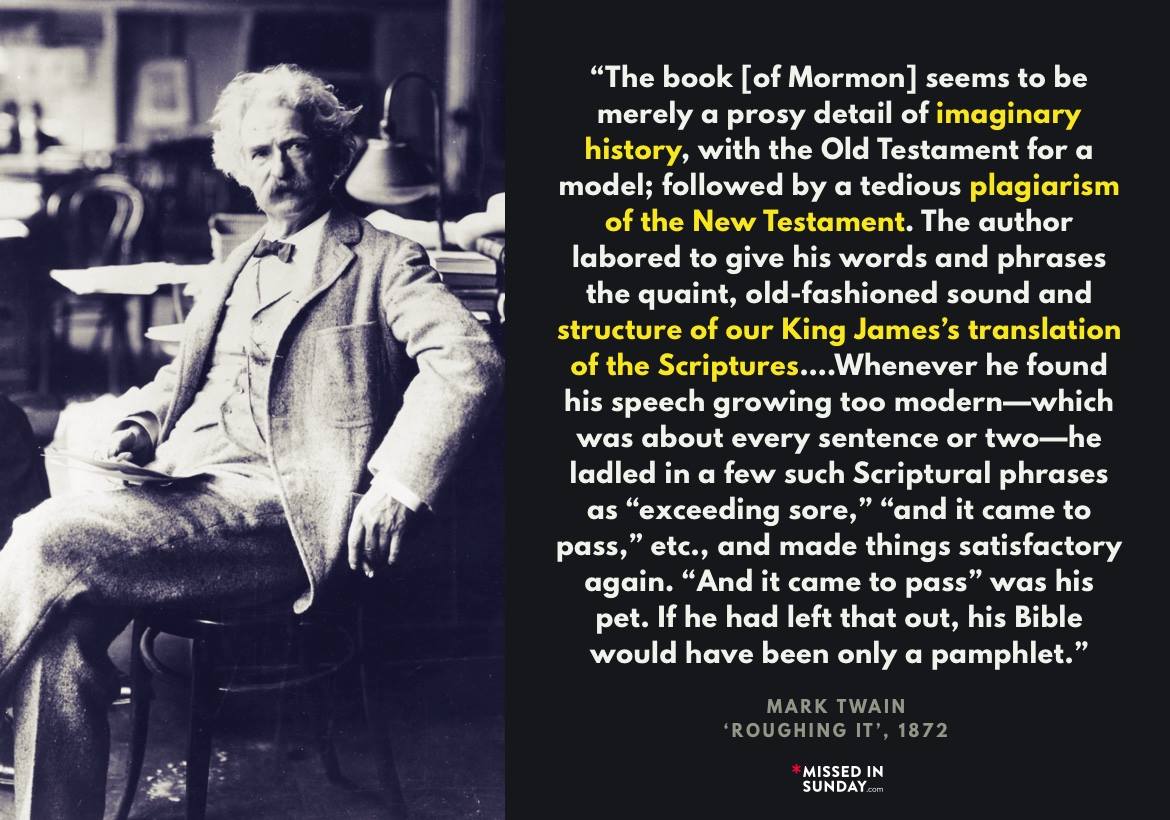
Roughing It
Excerpts from Mark Twain’s 1872 ‘Roughing It’: 1
“All men have heard of the Mormon Bible, but few except the “elect” have seen it, or, at least, taken the trouble to read it. I brought away a copy from Salt Lake. The book is a curiosity to me, it is such a pretentious affair, and yet so “slow,” so sleepy; such an insipid mess of inspiration. It is chloroform in print. If Joseph Smith composed this book, the act was a miracle—keeping awake while he did it was, at any rate. If he, according to tradition, merely translated it from certain ancient and mysteriously-engraved plates of copper, which he declares he found under a stone, in an out-of-the-way locality, the work of translating was equally a miracle, for the same reason.”
“The book seems to be merely a prosy detail of imaginary history, with the Old Testament for a model; followed by a tedious plagiarism of the New Testament. The author labored to give his words and phrases the quaint, old-fashioned sound and structure of our King James’s translation of the Scriptures; and the result is a mongrel—half modern glibness, and half ancient simplicity and gravity. The latter is awkward and constrained; the former natural, but grotesque by the contrast. Whenever he found his speech growing too modern—which was about every sentence or two—he ladled in a few such Scriptural phrases as “exceeding sore,” “and it came to pass,” etc., and made things satisfactory again. “And it came to pass” was his pet. If he had left that out, his Bible would have been only a pamphlet.”
“And when I am far on the road to conviction, and eight men, be they grammatical or otherwise, come forward and tell me that they have seen the plates too; and not only seen those plates but “hefted” them, I am convinced. I could not feel more satisfied and at rest if the entire Whitmer family had testified.”
References
References 1 Mark Twain, ‘Roughing it’, 1872 – https://archive.org/details/roughingitbymark01twaiuoft -
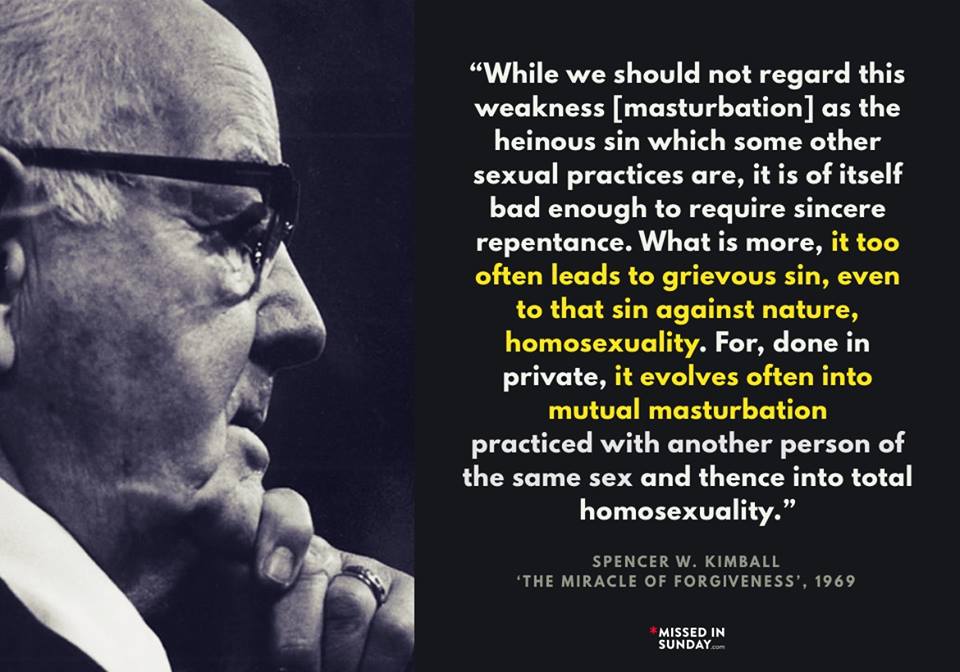
Mutual Masturbation
Excerpt from Spencer W. Kimball’s ‘The Miracle of Forgiveness’, Chp. 6:1
“Youth come into contact early with masturbation. Many would-be authorities declare that it is natural and acceptable, and frequently young men I interview cite these advocates to justify their practice of it. To this we must respond that the world’s norms in many areas-drinking, smoking, and sex experience generally, to mention only a few-depart increasingly from God’s law. The Church has a different, higher norm.
Thus prophets anciently and today condemn masturbation. It induces feelings of guilt and shame. It is detrimental to spirituality. It indicates slavery to the flesh, not that mastery of it and the growth toward godhood which is the object of our mortal life. Our modern prophet has indicated that no young man should be called on a mission who is not free from this practice.
While we should not regard this weakness as the heinous sin which some other sexual practices are, it is of itself bad enough to require sincere repentance. What is more, it too often leads to grievous sin, even to that sin against nature, homosexuality. For, done in private, it evolves often into mutual masturbation–
practiced with another person of the same sex and thence into total homosexuality. “References
References 1 ‘The Miracle of Forgiveness’, Spencer W. Kimball (1969) – https://archive.org/stream/MiracleOfForgiveness/MoF_djvu.txt -
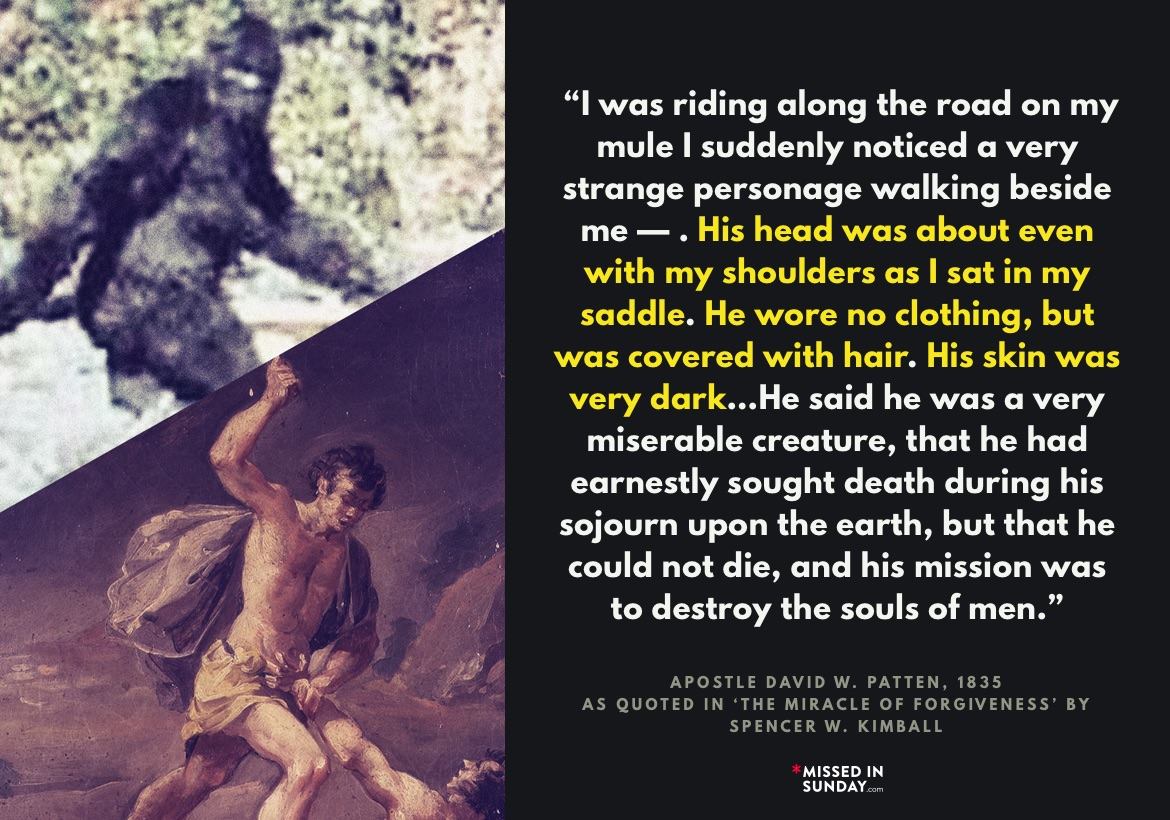
Cain
Excerpt from the ‘Miracle of Forgiveness’, Spencer W. Kimball: 1
“On the sad character Cain, an interesting story comes to us from Lycurgus A. Wilson’s book on the life of David W. Patten. From the book I quote an extract from a letter by Abraham O. Smoot giving his recollection of David Patten’s account of meeting “a very remarkable person who had represented himself as being Cain.
‘As I was riding along the road on my mule I suddenly noticed a very strange personage walking beside me… His head was about even with my shoulders as I sat in my saddle. He wore no clothing, but was covered with hair. His skin was very dark. I asked him where he dwelt and he replied that he had no home, that he was a wanderer in the earth and traveled to and fro. He said he was a very miserable creature, that he had earnestly sought death during his sojourn upon the earth, but that he could not die, and his mission was to destroy the souls of men. About the time he expressed himself thus, I rebuked him in the name of the Lord Jesus Christ and by virtue of the holy priesthood, and commanded him to go hence, and he immediately departed out of my sight…”
References
References 1 ‘The Miracle of Forgiveness’, Spencer W. Kimball – https://archive.org/stream/MiracleOfForgiveness/MoF_djvu.txt -

Word of Wisdom
Excerpt from a 1977 General Conference address by Gordon B. Hinckley: 1
“The so-called Mormon code of health, widely praised in these days of cancer and heart research, is in reality a revelation given to Joseph Smith in 1833 as a “Word of Wisdom” from the Lord. (D&C 89:1.) In no conceivable way could it have come of the dietary literature of the time, nor from the mind of the man who announced it. Today, in terms of medical research, it is a miracle, whose observance has saved incalculable suffering and premature death for uncounted tens of thousands.”
Wine and Strong Drink
???? D&C 89 – 1833 2
5 That inasmuch as any man drinketh wine or strong drink among you, behold it is not good, neither meet in the sight of your Father, only in assembling yourselves together to offer up your sacraments before him.
???? Means of Preserving Health, and Preventing Diseases – 3
P. 31 Those who indulge in wine and strong liquors, are, also, often afflicted with that painful and excruciating disorder, the gravel, which rarely yields to the power of any medicine hitherto discovered.”
P. 31 Means of Preserving Health, and Preventing Diseases… Wine…when drunk frequently and copiously, it generally, sooner or later, injures the constitution, or renders it subject to inflammatory diseases. It is a powerful stimulant, the long continued use of which, rarely fails to induce debility. Hence, great wine-drinkers, somewhat advanced in life, are generally low-spirited, and often afflicted with a long train of hypochondrical symptoms and incurable diseases…
P. 34 [Concerning distilled spirits] their frequent and excessive use is not only unnecessary, but highly injurious; and has destroyed thousands; perhaps more than either pestilence, famine, or the sword. I need not, therefore, take much pains to show their evil consequences, either in a medical, political, moral, or religious point of view;???? Journal of Health – 1830 4
P. 38 …strong drinks, which soon leads to intemperance and drunkenness.
Hot Drinks
???? D&C 89 – 1833
9 And again, hot drinks are not for the body or belly.
???? Means of Preserving Health, and Preventing Diseases – 1806
P. 92 It is supposed, that tea contains a volatile, cordial, or reviving principle; which, if admitted is nothing in favour of its wholesomeness for constant use; for powers of a stimulant nature, when long continued, are sure to be followed by an atonic or debilitated state of the stomach; and, finally, of the whole constitution. Many cheaper and more innocent substitutes may be found in our own country; which, if prepared in a similar manner, should be used rather cool than hot.
P. 99 It is rare to see great and constant drinkers of strong tea and coffee, somewhat advanced in life, who have not some symptoms of weakness, tremors, or indigestion: wherefore, it is judged, that the great number and increase of paralytic, nervous, and hypochondriac diseases are, in part, to be attributed to the frequent and excessive use of those articles, drunk in a hot and strong state.
P. 99 Did women know the train of diseases induced by debility, and how disagreeable these diseases render them to the other sex, they would shun tea as the most deadly poison. No man can love a woman eaten up with vapours…Avoid, likewise, the excessive use of hot drinks, such as coffee, chocolate, and tea, particularly the last, in which the inhabitants of this country indulge more than any other beverage???? Journal of Health – 1830
P. 18 Mrs.___complains of sick headache,—she cannot sleep, she is nervous and unhappy. Advise her to give up drinking coffee and green tea, and to take a walk in the open air everyday.
P. 211 Even the use of coffee and tea must, in many cases, be discontinued.
P. 332 I gave up at once the use of tea, coffee, and animal food.
P. 351 You are better without coffee, tea, or chocolate.Tobacco
???? D&C 89 – 1833
8 And again, tobacco is not for the body, neither for the belly, and is not good for man, but is an herb for bruises and all sick cattle, to be used with judgment and skill.
???? Means of Preserving Health, and Preventing Diseases – 1806
P. 226 In no one view, is it possible to contemplate the creature man in a more absurd and ridiculous light; than in his attachment to tobacco. This weed is of a stimulating nature, whether it be used in smoking, chewing, or in snuff…
P. 226 The progress of habit in the use of tobacco is exactly the same as in the use of spirituous liquors. The slaves of it begin by using it only after dinner; then during the whole afternoon and evening; afterwards, before dinner; then before breakfast; and, finally, during the whole night.
P. 226 The oil of tobacco is of so active and virulent a nature, that a few drops of it have proven fatal.
P. 226 This plant is possessed of narcotic properties, by which it produces, in those who first begin to smoke it, giddiness, cold sweats, vomiting, purging;???? Journal of Health – 1830
P. 37 Tobacco is, in fact, an absolute poison.
P. 329 That few substances arecapable of exerting effects so sudden and destructive as this poisonous plant [tobacco].Meat
???? D&C 89 – 1833
12 Yea, flesh also of beasts and of the fowls of the air, I, the Lord, have ordained for the use of man with thanksgiving; nevertheless they are to be used sparingly;
13 And it is pleasing unto me that they should not be used, only in times of winter, or of cold, or famine.???? Means of Preserving Health, and Preventing Diseases – 1806
P. 108 A reason for avoiding much animal food, especially in cities, and during the summer season, is, that a great part of the fresh meat brought to market, becomes overheated and feverish by long keeping…and some, perhaps, has already undergone the incipient stage of putrefaction before it is cooked…It is therefore, recommended to all in hot seasons and climates, to abstain from much animal food…
P. 119 …although animal food may be admissible by the human economy…for the most part, a small portion of it only is necessary; that the very temperate and sparing use of it is the surest means of preserving health, and obtaining long life; whilst the large use of it tends to the production of diseases…
P. 114 Melted fat, or the drippings of baked and roasted meat, are equally, if not more, pernicious to the stomach than even stale butter, and both ought to be used only for greasing cart-wheels, and not for injuring human organs.???? Journal of Health – 1830
P. 351 Meat and fish ought to be used sparingly,
P. 15 …the large majority of mankind do not eatany animal food, or so sparingly, and at such long intervals, that it cannot be said to form their nourishment. Millions in Asia are sustained by rice alone…Additional Study
A Historical Analysis of the Word of Wisdom, BYU – http://scholarsarchive.byu.edu/cgi/viewcontent.cgi?article=6038&context=etd
Temperance Movement – https://en.wikipedia.org/wiki/Temperance_movementReferences
References 1 Joseph the Seer, Gordon B. Hinckley – https://www.lds.org/general-conference/1977/04/joseph-the-seer?lang=eng 2 Doctrine Covenants 89, The Word of Wisdom – https://www.lds.org/scriptures/dc-testament/dc/89?lang=eng 3 1806 Means of preserving health, and preventing diseases, 1806, Ricketson, Shadrach – https://archive.org/details/meansofpreservin00rick 4 Journal of Health, 1830 – https://archive.org/details/journalofhealth01slsn -

Truth vs Indoctrination
Image: Screenshot from It’s a Miracle (1984). Gary B. Lundberg’s video adaptation of Douglas and Janice Kapp Perry’s 1981 stage musical about a young man’s tough decision to go to on a mission.
Truth is most often used to mean being in accord with fact or reality, or fidelity to an original or standard. Truth may also often be used in modern contexts to refer to an idea of “truth to self,” or authenticity. (Truth – Wikipedia)
Indoctrination implies forcibly or coercively causing people to act and think on the basis of a certain ideology. (Indoctrination – Wikipedia)
Crash Course:
Warning Signs of an Unsafe Group (podcast) – Mormon Discussion
-
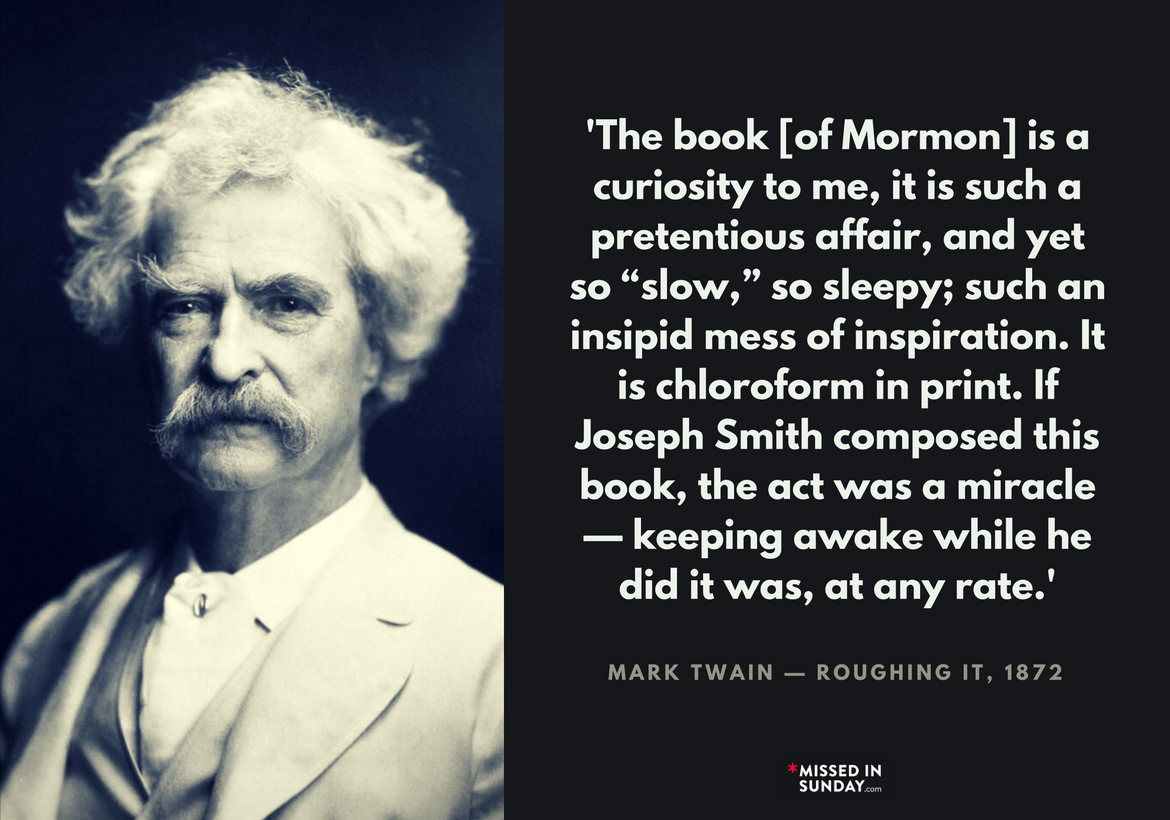
Mark Twain
Image: Samuel Langhorne Clemens (November 30, 1835 – April 21, 1910), better known by his pen name Mark Twain, was an American writer, humorist, entrepreneur, publisher, and lecture.
In Mark Twain’s book titled Roughing It (1872), he gives a review of the Book of Mormon:
All men have heard of the Mormon Bible, but few except the “elect” have seen it, or, at least, taken the trouble to read it. I brought away a copy from Salt Lake. The book is a curiosity to me, it is such a pretentious affair, and yet so “slow,” so sleepy; such an insipid mess of inspiration. It is chloroform in print. If Joseph Smith composed this book, the act was a miracle—keeping awake while he did it was, at any rate. If he, according to tradition, merely translated it from certain ancient and mysteriously-engraved plates of copper, which he declares he found under a stone, in an out-of-the-way locality, the work of translating was equally a miracle, for the same reason.
The book seems to be merely a prosy detail of imaginary history, with the Old Testament for a model; followed by a tedious plagiarism of the New Testament. The author labored to give his words and phrases the quaint, old-fashioned sound and structure of our King James’s translation of the Scriptures; and the result is a mongrel—half modern glibness, and half ancient simplicity and gravity. The latter is awkward and constrained; the former natural, but grotesque by the contrast. Whenever he found his speech growing too modern—which was about every sentence or two—he ladled in a few such Scriptural phrases as “exceeding sore,” “and it came to pass,” etc., and made things satisfactory again. “And it came to pass” was his pet. If he had left that out, his Bible would have been only a pamphlet.
The title-page reads as follows:THE BOOK OF MORMON: AN ACCOUNT WRITTEN BY THE HAND OF MORMON, UPON PLATES TAKEN FROM THE PLATES OF NEPHI.
Wherefore it is an abridgment of the record of the people of Nephi, and also of the Lamanites; written to the Lamanites, who are a remnant of the House of Israel; and also to Jew and Gentile; written by way of commandment, and also by the spirit of prophecy and of revelation. Written and sealed up, and hid up unto the Lord, that they might not be destroyed; to come forth by the gift and power of God unto the interpretation thereof; sealed by the hand of Moroni, and hid up unto the Lord, to come forth in due time by the way of Gentile; the interpretation thereof by the gift of God. An abridgment taken from the Book of Ether also; which is a record of the people of Jared; who were scattered at the time the Lord confounded the language of the people when they were building a tower to get to Heaven.
“Hid up” is good. And so is “wherefore”—though why “wherefore”? Any other word would have answered as well—though—in truth it would not have sounded so Scriptural.
Next comes:THE TESTIMONY OF THREE WITNESSES.
Be it known unto all nations, kindreds, tongues, and people unto whom this work shall come, that we, through the grace of God the Father, and our Lord Jesus Christ, have seen the plates which contain this record, which is a record of the people of Nephi, and also of the Lamanites, their brethren, and also of the people of Jared, who came from the tower of which hath been spoken; and we also know that they have been translated by the gift and power of God, for His voice hath declared it unto us; wherefore we know of a surety that the work is true. And we also testify that we have seen the engravings which are upon the plates; and they have been shown unto us by the power of God, and not of man. And we declare with words of soberness, that an angel of God came down from heaven, and he brought and laid before our eyes, that we beheld and saw the plates, and the engravings thereon; and we know that it is by the grace of God the Father, and our Lord Jesus Christ, that we beheld and bear record that these things are true; and it is marvellous in our eyes; nevertheless the voice of the Lord commanded us that we should bear record of it; wherefore, to be obedient unto the commandments of God, we bear testimony of these things. And we know that if we are faithful in Christ, we shall rid our garments of the blood of all men, and be found spotless before the judgment-seat of Christ, and shall dwell with Him eternally in the heavens. And the honor be to the Father, and to the Son, and to the Holy Ghost, which is one God. Amen.
OLIVER COWDERY, DAVID WHITMER, MARTIN HARRIS.
Some people have to have a world of evidence before they can come anywhere in the neighborhood of believing anything; but for me, when a man tells me that he has “seen the engravings which are upon the plates,” and not only that, but an angel was there at the time, and saw him see them, and probably took his receipt for it, I am very far on the road to conviction, no matter whether I ever heard of that man before or not, and even if I do not know the name of the angel, or his nationality either.
Next is this:AND ALSO THE TESTIMONY OF EIGHT WITNESSES. Be it known unto all nations, kindreds, tongues, and people unto whom this work shall come, that Joseph Smith, Jr., the translator of this work, has shown unto us the plates of which hath been spoken, which have the appearance of gold; and as many of the leaves as the said Smith has translated, we did handle with our hands; and we also saw the engravings thereon, all of which has the appearance of ancient work, and of curious workmanship. And this we bear record with words of soberness, that the said Smith has shown unto us, for we have seen and hefted, and know of a surety that the said Smith has got the plates of which we have spoken. And we give our names unto the world, to witness unto the world that which we have seen; and we lie not, God bearing witness of it. CHRISTIAN WHITMER, JACOB WHITMER, PETER WHITMER, JR., JOHN WHITMER, HIRAM PAGE, JOSEPH SMITH, SR., HYRUM SMITH, SAMUEL H. SMITH.
And when I am far on the road to conviction, and eight men, be they grammatical or otherwise, come forward and tell me that they have seen the plates too; and not only seen those plates but “hefted” them, I am convinced. I could not feel more satisfied and at rest if the entire Whitmer family had testified.
The Mormon Bible consists of fifteen “books”—being the books of Jacob, Enos, Jarom, Omni, Mosiah, Zeniff, Alma, Helaman, Ether, Moroni, two “books” of Mormon, and three of Nephi.In the first book of Nephi is a plagiarism of the Old Testament, which gives an account of the exodus from Jerusalem of the “children of Lehi”; and it goes on to tell of their wanderings in the wilderness, during eight years, and their supernatural protection by one of their number, a party by the name of Nephi. They finally reached the land of “Bountiful,” and camped by the sea. After they had remained there “for the space of many days”—which is more Scriptural than definite—Nephi was commanded from on high to build a ship wherein to “carry the people across the waters.” He travestied Noah’s ark—but he obeyed orders in the matter of the plan. He finished the ship in a single day, while his brethren stood by and made fun of it—and of him, too—“saying, our brother is a fool, for he thinketh that he can build a ship.” They did not wait for the timbers to dry, but the whole tribe or nation sailed the next day. Then a bit of genuine nature cropped out, and is revealed by outspoken Nephi with Scriptural frankness—they all got on a spree! They, “and also their wives, began to make themselves merry, insomuch that they began to dance, and to sing, and to speak with much rudeness; yea, they were lifted up unto exceeding rudeness.”
Nephi tried to stop these scandalous proceedings; but they tied him neck and heels, and went on with their lark. But observe how Nephi the prophet circumvented them by the aid of the invisible powers:And it came to pass that after they had bound me, insomuch that I could not move, the compass, which had been prepared of the Lord, did cease to work; wherefore, they knew not whither they should steer the ship, insomuch that there arose a great storm, yea, a great and terrible tempest, and we were driven back upon the waters for the space of three days; and they began to be frightened exceedingly, lest they should be drowned in the sea; nevertheless they did not loose me. And on the fourth day, which we had been driven back, the tempest began to be exceeding sore. And it came to pass that we were about to be swallowed up in the depths of the sea.
Then they untied him.
And it came to pass after they had loosed me, behold, I took the compass, and it did work whither I desired it. And it came to pass that I prayed unto the Lord; and after I had prayed, the winds did cease, and the storm did cease, and there was a great calm.
Equipped with their compass, these ancients appear to have had the advantage of Noah.
Their voyage was toward a “promised land”—the only name they give it. They reached it in safety.
Polygamy is a recent feature in the Mormon religion, and was added by Brigham Young after Joseph Smith’s death. Before that, it was regarded as an “abomination.” This verse from the Mormon Bible occurs in Chapter II. of the book of Jacob:For behold, thus saith the Lord, this people begin to wax in iniquity; they understand not the Scriptures; for they seek to excuse themselves in committing whoredoms, because of the things which were written concerning David, and Solomon his son. Behold, David and Solomon truly had many wives and concubines, which thing was abominable before me, saith the Lord; wherefore, thus saith the Lord, I have led this people forth out of the land of Jerusalem, by the power of mine arm, that I might raise up unto me a righteous branch from the fruit of the loins of Joseph. Wherefore, I the Lord God, will no suffer that this people shall do like unto them of old.
However, the project failed—or at least the modern Mormon end of it—for Brigham “suffers” it. This verse is from the same chapter:
Behold, the Lamanites your brethren, whom ye hate, because of their filthiness and the cursings which hath come upon their skins, are more righteous than you; for they have not forgotten the commandment of the Lord, which was given unto our fathers, that they should have, save it were one wife; and concubines they should have none.
The following verse (from Chapter IX. of the Book of Nephi) appears to contain information not familiar to everybody:
And now it came to pass that when Jesus had ascended into heaven, the multitude did disperse, and every man did take his wife and his children, and did return to his own home.
And it came to pass that on the morrow, when the multitude was gathered together, behold, Nephi and his brother whom he had raised from the dead, whose name was Timothy, and also his son, whose name was Jonas, and also Mathoni, and Mathonihah, his brother, and Kumen, and Kumenenhi, and Jeremiah, and Shemnon, and Jonas, and Zedekiah, and Isaiah; now these were the names of the disciples whom Jesus had chosen.In order that the reader may observe how much more grandeur and picturesqueness (as seen by these Mormon twelve) accompanied on of the tenderest episodes in the life of our Saviour than other eyes seem to have been aware of, I quote the following from the same “book”—Nephi:
And it came to pass that Jesus spake unto them, and bade them arise. And they arose from the earth, and He said unto them, Blessed are ye because of your faith. And now behold, My joy is full. And when He had said these words, He wept, and the multitude bear record of it, and He took their little children, one by one, and blessed them, and prayed unto the Father for them. And when He had done this He wept again, and He spake unto the multitude, and saith unto them, Behold your little ones. And as they looked to behold, they cast their eyes toward heaven, and they saw the heavens open, and they saw angels descending out of heaven as it were, in the midst of fire; and they came down and encircled those little ones about, and they were encircled about with fire; and the angels did minister unto them, and the multitude did see and hear and bear record; and they know that their record is true, for they all of them did see and hear, every man for himself; and they were in number about two thousand and five hundred souls; and they did consist of men, women, and children.
And what else would they be likely to consist of?
The Book of Ether is an incomprehensible medley of if “history,” much of it relating to battles and sieges among peoples whom the reader has possibly never heard of; and who inhabited a country which is not set down in the geography. These was a King with the remarkable name of Coriantumr,^^ and he warred with Shared, and Lib, and Shiz, and others, in the “plains of Heshlon”; and the “valley of Gilgal”; and the “wilderness of Akish”; and the “land of Moran”; and the “plains of Agosh”; and “Ogath,” and “Ramah,” and the “land of Corihor,” and the “hill Comnor,” by “the waters of Ripliancum,” etc., etc., etc. “And it came to pass,” after a deal of fighting, that Coriantumr, upon making calculation of his losses, found that “there had been slain two millions of mighty men, and also their wives and their children”—say 5,000,000 or 6,000,000 in all—“and he began to sorrow in his heart.” Unquestionably it was time. So he wrote to Shiz, asking a cessation of hostilities, and offering to give up his kingdom to save his people. Shiz declined, except upon condition that Coriantumr would come and let him cut his head off first—a thing which Coriantumr would not do. Then there was more fighting for a season; then four years were devoted to gathering the forces for a final struggle—after which ensued a battle, which, I take it, is the most remarkable set forth in history,—except, perhaps, that of the Kilkenny cats, which it resembles in some respects. This is the account of the gathering and the battle:7. And it came to pass that they did gather together all the people, upon all the face of the land, who had not been slain, save it was Ether. And it came to pass that Ether did behold all the doings of the people; and he beheld that the people who were for Coriantumr, were gathered together to the army of Coriantumr; and the people who were for Shiz, were gathered together to the army of Shiz; wherefore they were for the space of four years gathering together the people, that they might get all who were upon the face of the land, and that they might receive all the strength which it was possible that they could receive. And it came to pass that when they were all gathered together, every one to the army which he would, with their wives and their children; both men, women, and children being armed with weapons of war, having shields, and breast-plates, and head-plates, and being clothed after the manner of war, they did march forth one against another, to battle; and they fought all that day, and conquered not. And it came to pass that when it was night they were weary, and retired to their camps; and after they had retired to their camps, they took up a howling and a lamentation for the loss of the slain of their people; and so great were their cries, their howlings and lamentations, that it did rend the air exceedingly. And it came to pass that on the morrow they did go again to battle, and great and terrible was that day; nevertheless they conquered not, and when the night came again, they did rend the air with their cries, and their howlings, and their mournings, for the loss of the slain of their people.
8. And it came to pass that Coriantumr wrote again an epistle unto Shiz, desiring that he would not come again to battle, but that he would take the kingdom, and spare the lives of the people. But behold, the Spirit of the Lord had ceased striving with them, and Satan had full power over the hearts of the people, for they were given up unto the hardness of their hearts, and the blindness of their minds that they might be destroyed; wherefore they went again to battle. And it came to pass that they fought all that day, and when the night came they slept upon their swords; and on the morrow they fought even until the night came; and when the night came they were drunken with anger, even as a man who is drunken with wine; and they slept again upon their swords; and on the morrow they fought again; and when the night came they had all fallen by the sword save it were fifty and two of the people of Coriantumr, and sixty and nine of the people of Shiz. And it came to pass that they slept upon their swords that night, and on the morrow they fought again, and they contended in their mights with their swords, and with their shields, all that day; and when the night came there were thirty and two of the people of Shiz, and twenty and seven of the people of Coriantumr.9. And it came to pass that they ate and slept, and prepared for death on the morrow. And they were large and mighty men, as to the strength of men. And it came to pass that they fought for the space of three hours, and they fainted with the loss of blood. And it came to pass that when the men of Coriantumr had received sufficient strength, that they could walk, they were about to flee for their lives, but behold, Shiz arose, and also his men, and he swore in his wrath that he would slay Coriantumr, or he would perish by the sword: wherefore he did pursue them, and on the morrow he did overtake them; and they fought again with the sword. And it came to pass that when they had all fallen by the sword, save it were Coriantumr and Shiz, behold Shiz had fainted with loss of blood. And it came to pass that when Coriantumr had leaned upon his sword, that he rested a little, he smote off the head of Shiz. And it came to pass that after he had smote off the head of Shiz, that Shiz raised upon his hands and fell; and after that he had struggled for breath, he died. And it came to pass that Coriantumr fell to the earth, and became as if he had no life. And the Lord spake unto Ether, and said unto him, go forth. And he went forth, and beheld that the words of the Lord had all been fulfilled; and he finished his record; and the hundredth part I have not written.
It seems a pity he did not finish, for after all his dreary former chapters of commonplace, he stopped just as he was in danger of becoming interesting.
The Mormon Bible is rather stupid and tiresome to read, but there is nothing vicious in its teachings. Its code of morals is unobjectionable- -it is “smouched” [Milton] from the New Testament and no credit given.
Crash Course:
Roughing It – Mark Twain, 1872



